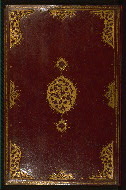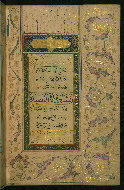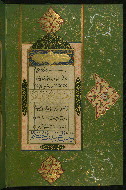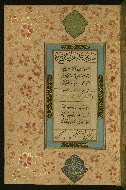Home > Digitized Walters Manuscripts
This document is a tranformation of a TEI P5 XML manuscript description incorporating images. If you have trouble reading special or non-Latin characters on this page, please make sure you have appropriate Unicode fonts installed and an up-to-date web browser.
Walters Ms. W.582, Poem in honor of the Prophet Muhammad
Browse images (Browse images in a new window) | TEI in XML format
W.582
Poem in honor of the Prophet Muhammad
Vernacular: قصيدة البردة
Authority name: al-Būṣīrī (d. 694 AH / 1294 CE)
As-written name: Sharaf al-Dīn Muḥammad ibn Saʿīd al-Būṣīrī
Name, in vernacular: شرف الدين محمد بن سعيد البوصيري
This is an illuminated copy of the famous poem in honor of the Prophet Muhammad, popularly known as Qaṣīdat al-burdah (Poem of the mantle), composed by Sharaf al-Dīn Muḥammad al-Būṣīrī (d. 694 AH / 1294 CE). The text was written in a variety of scripts in the eleventh century AH / seventeenth CE. According to the colophon, written in riqāʿ script, it was executed by Ḥabīb Allāh ibn Dūst Muḥammad al-Khwārizmī. The text of the poem begins on fol. 5b. Each page has borders of various colors with illuminated floral and geometric motifs. The borders and brown leather binding date to the twelfth century AH / eighteenth CE.
11th century AH / 17th CE
Iran (or Turkey?)
As-written name: Ḥabīb Allāh ibn Dūst Muḥammad al-Khuwārizmī
Name, in vernacular: حبيب الله بن دوست محمد الخوارزمي
Book
Literary -- Poetry
The primary language in this manuscript is Arabic.
- Transliteration: mashaqahu al-ʿabd al-mudhnib /1/ al-rājī ilá raḥmat rabbih al-ghanī /2/ Ḥabīb Allāh ibn Dūst Muḥammad /3/ al-Khwārizmī ghafara dhunūbahumā /4/ wa-satara ʿuyūbahumā bi-ḥurmat al-nabī /5/ wa-<ā>lih wa-ṣaḥbih wa-sallama h (= intahá) /6/
- Comment: Written in riqāʿ script giving the name of the scribe as Ḥabīb Allāh ibn Dūst Muḥammad al-Khwārizmī
Paper
Cream glazed paper for main panels; multi-colored paper for inlaid margins
Foliation: ii+23+ii
Catchwords: Written on versos
16.5 cm wide by 25.5 cm high
6.5 cm wide by 13.0 cm high
- Columns: 1
- Ruled lines: 9
- Text laid out in five panels inscribed in different scripts and in red, blue, black, and gold
- Title: Qaṣīdat al-burdah
- Author: al-Būṣīrī (d. 694 AH / 1294 CE)
- Scribe: Ḥabīb Allāh ibn Dūst Muḥammad al-Khuwārizmī
- Incipit: قال الشيخ الامام ... سبب انشائ هذه القصيدة ...
- Hand note: Written in polychrome vocalized text using the following scripts: thuluth, naskh, and muḥaqqaq for the main text, riqāʿ for the colophon
- Decoration note: Margins decorated with floral and geometrical designs, the latter in the form of stamp-like pendants
Upper board outside:

- Title: Binding
- Form: Binding
- Label: This dark brown leather binding has a narrow central panel with oval and pendants, as well as triangular cornerpieces. They are decorated with floral motifs and cloud scrolls.
fol. 1b:

- Title: Incipit page with illuminated headpiece
- Form: Incipit; headpiece
- Label: The codex opens with this decorated incipit page with an illuminated rectangular headpiece. The page has five inner panels of text executed in the following scripts: muḥaqqaq (gold), naskh (black), and thuluth (blue).
fol. 5b:

- Title: Incipit page with illuminated headpiece
- Form: Incipit
- Label: The poem begins on this illuminated page. The central panel is framed by decorated margins and a domed headpiece. The text itself is divided into four panels executed in naskh (black) and thuluth (gold and blue) scripts.
fol. 23a:
The binding is not original.
Probably dates to the later twelfth century AH / eighteenth CE, contemporary with the inlaid margins; red goatskin (with flap); central lobed oval with pendants and cornerpieces; doublures of black leather with central lobed oval and pendants brushed with gold
Two erased large seals (fol. 1a)
Walters Art Museum, 1931, by Henry Walters bequest
Brockelmann, Carl. Geschichte der arabischen Litteratur (New York; Köln: E.J. Brill, 1996), 1: 308; S1: 467.
Principal cataloger: Gacek, Adam
Catalogers: Landau, Amy; Smith, Sita
Editor: Bockrath, Diane
Conservators: Jewell, Stephanie; Quandt, Abigail
Contributors: Barrera, Christina; Emery, Doug; Herbert, Lynley; Noel, William; Simpson, Shreve; Tabritha, Ariel; Toth, Michael B.; Valle, Chiara
The Walters Art Museum
Licensed for use under Creative Commons Attribution-NonCommercial-ShareAlike 3.0 Unported Access Rights, http://creativecommons.org/licenses/by-nc-sa/3.0/legalcode. It is requested that copies of any published articles based on the information in this data set be sent to the curator of manuscripts, The Walters Art Museum, 600 North Charles Street, Baltimore MD 21201.
